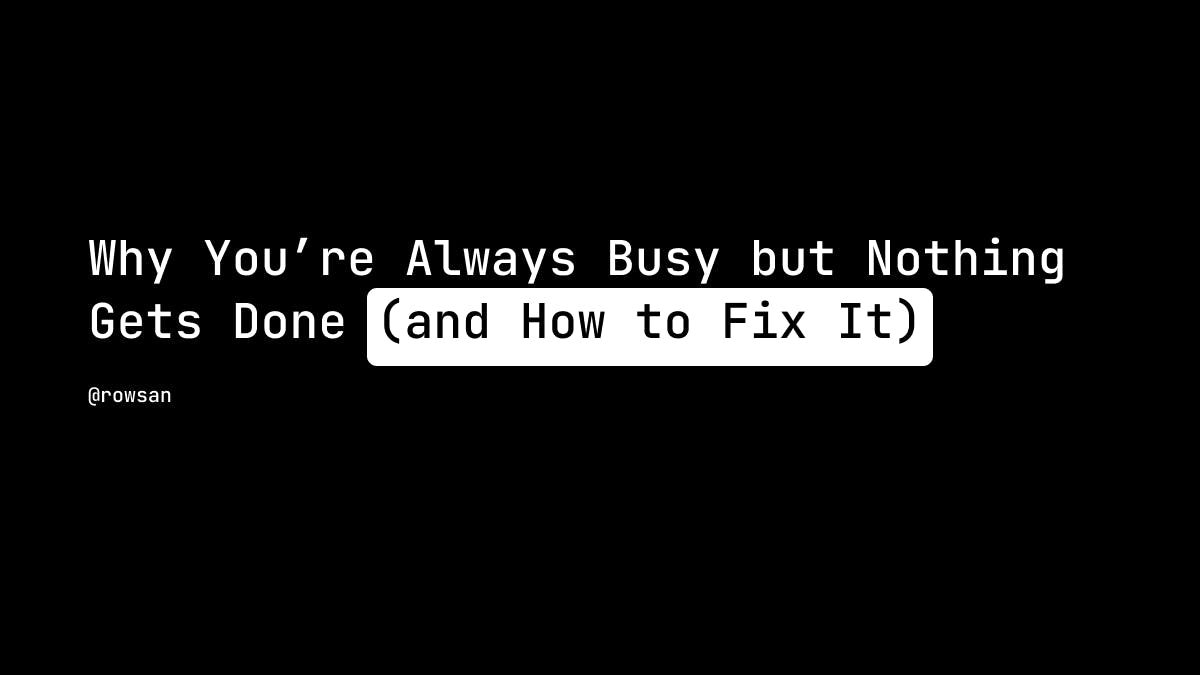You open your laptop at 10 AM.
You check some emails, reply to a few messages.
You jump into a meeting. Then another.
You scroll through some docs, push a little code.
You blink — it’s 6 PM.
You’ve been “working” all day.
But when you look at what you actually finished…
It’s nothing you’re proud of.
No real progress. No flow. Just... busy noise.
You’re not alone.
This is one of the most common problems developers and tech workers face:
Busy days with no results.
Let’s break down why this happens and how to fix it for good.
Join my free newsletter where I share content related to software development:
1. You Mistake Motion for Progress
Replying to Slack messages, checking GitHub notifications, and updating Jira cards — all feel like work.
But they’re not real work. They’re motion.
Motion is what keeps your brain active, but not effective.
You feel busy because your brain is switching contexts nonstop.
But at the end of the day, you didn’t actually finish anything that moves your goals forward.
Fix: Focus on Output, Not Activity
Start your day with this question:
“What’s the one thing I can finish today that will actually move my project forward?”
Then do that thing first.
Before meetings. Before Slack.
Before anything.
Train yourself to recognize motion and avoid it in your deep work hours.
2. Your Day Is Fragmented
Most developers never get more than 30 minutes of uninterrupted focus.
Calls. Messages. Sync-ups.
Your time gets broken into tiny pieces.
And real work — especially writing code — requires long, focused blocks.
You can't solve real problems in tiny bursts.
You need space.
Fix: Use “Time Blocking” Like a Wall
Block 2–3 hours each day on your calendar for deep work.
Label it as “Do Not Disturb” or “Focus Time”.
Turn off Slack notifications.
Put your phone away.
You can do 10x the work in 2 hours of focus compared to 8 hours of distraction.
3. You’re Working Without Clarity
You sit down to code, but you're not sure what exactly needs to be done.
So you wander. You jump between files. You open tabs. You read docs.
This creates a loop: confusion → hesitation → procrastination → wasted day.
Fix: Always Define the Next Step
Before you open your code editor, write this down:
“The next step I need to complete is…”
Keep it small and clear.
Not “build the login feature.”
Instead:
- “Connect the login form to the API.”
- “Handle the error message on failed login.”
- “Write a unit test for the auth context.”
Clarity eliminates decision fatigue.
It keeps you moving, one step at a time.
4. You Say Yes to Everything
“Can you review this PR real quick?”
“Can we jump on a call?”
“Can you help debug this?”
Each “yes” steals time from your priorities.
You become reactive instead of focused.
By the end of the day, you’ve helped everyone else… but made no progress of your own.
Fix: Protect Your Schedule
Start saying:
- “I can do this after 2 PM — I’m deep in something right now.”
- “Can it wait until I wrap this up?”
- “Let’s schedule time for this tomorrow.”
Being available 24/7 doesn’t make you helpful — it makes you ineffective.
Your real value is in getting important work done.
Protect the time to do it.
5. You Don’t Plan, You React
You start your day checking emails.
Then Slack.
Then tasks others throw at you.
You never stop to ask:
“What’s my plan for today?”
So you bounce around, reacting to everyone else’s plans.
It feels productive in the moment — but it’s directionless.
Fix: The 10-Minute Daily Plan
Spend 10 minutes every morning doing this:
- Review your tasks.
- Pick the top 1–3 things you want to finish today.
- Write them down where you can see them.
- Block time for them in your calendar.
Make your day intentional, not accidental.
6. You Overcomplicate Things
We overthink. We overplan. We aim for perfection.
Instead of finishing one clear task, we create five new ones.
You build the UI, but now you want to refactor the whole codebase.
You want to write tests, but end up rewriting the logic.
It feels like you’re making things better…
But you’re also delaying the finish line.
Fix: Prioritize Done Over Perfect
Ask yourself:
“Is this good enough to ship?”
“What’s the smallest version I can deliver right now?”
Get it done.
Get feedback.
Then improve.
Shipped is better than stuck.
7. You Don’t Review Your Day
At the end of the day, you feel tired.
But you don’t know what you did.
There’s no closure. No feedback loop.
This kills momentum.
Fix: The 3-Minute Review.
Every day before you log off, ask:
- What did I finish today?
- What got in the way?
- What’s the first thing I’ll do tomorrow?
This builds awareness.
And awareness builds control.
Final Thoughts
Being busy is easy.
Being effective takes discipline.
Most developers don’t need more hours.
They need more clarity, focus, and boundaries.
Here’s the recap:
✅ Pick 1 meaningful task per day
✅ Block time for deep work
✅ Define small next steps
✅ Say “no” more often
✅ Plan your day in 10 minutes
✅ Aim for progress, not perfection
✅ Review daily for feedback
Join my free newsletter where I share content related to software development:
Start with one fix.
Apply it consistently.
And you’ll go from “always busy” to finally making things happen.


